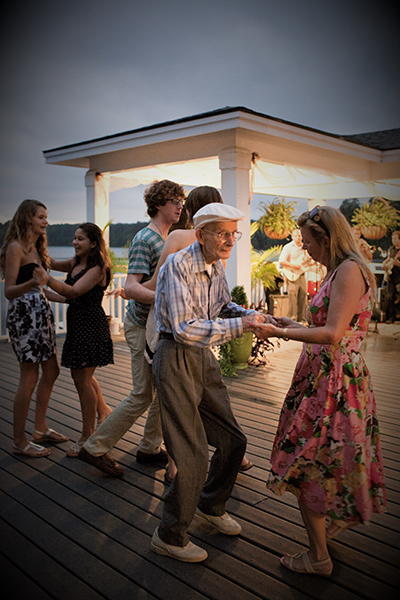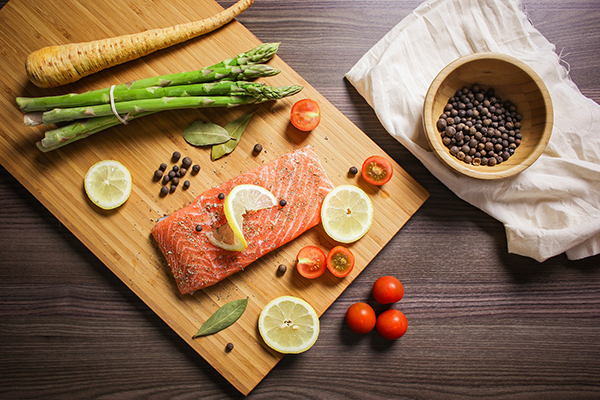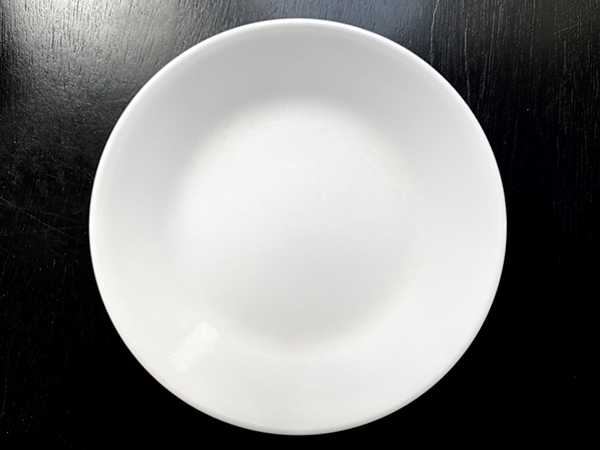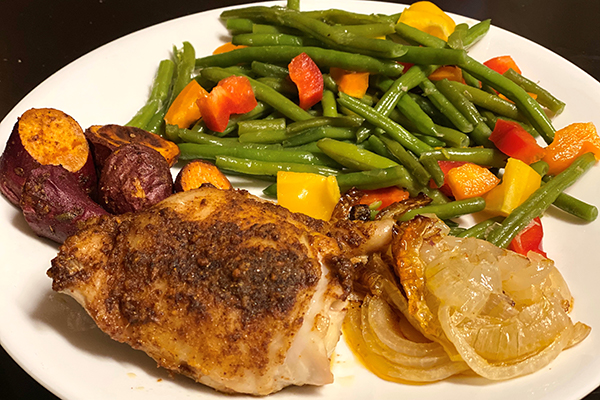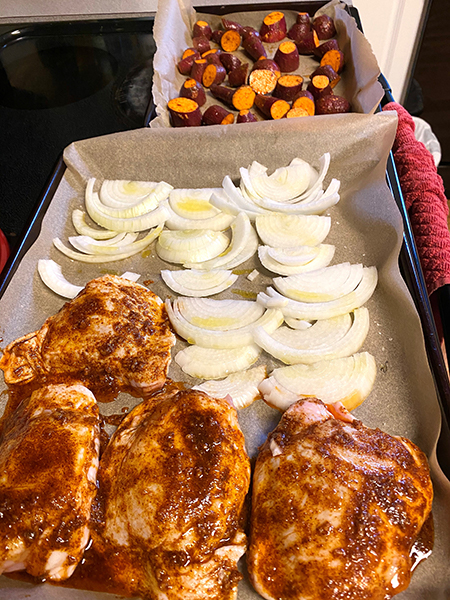We are all aging, every day, and there is nothing we can do about that (at least not yet). BUT there are many things we can do that determine HOW we age and how long we live. Only a small amount of our longevity is determined by genetics (estimated to be between 10-25%), which means that we control the overwhelming majority through our diet and lifestyle.
I would bet that most of us want to feel good as we get older and we want to be able to do all the things we enjoy doing. Sadly, that’s not how most people age in America and much of the world right now. What many of us have seen with grandparents or even our parents is a long, slow decline, lots of medications, many doctor visits, surgeries, etc. It doesn’t have to be that way, not if we start paying attention now and start optimizing our health for longevity.
What to Eat to Increase Longevity
What we eat or don’t eat plays a huge role in our health and longevity. Overall, we want to eat in a way that will reduce our risk of chronic disease (the top killers – heart disease, cancer and diabetes), reduce inflammation and provide our body with all the nutrients that it needs to function optimally. So, what does this look like? It means we are eating mostly real, whole unprocessed foods.
- 8-10 servings of non-starchy vegetables per day *
- a colorful variety – work up to this amount
- 2 servings of whole fruit per day*
- a colorful variety
- High-quality oils and fats
- extra virgin olive oil, avocados, nuts and seeds
- 2-3 servings of omega-3 rich fish per week
- wild salmon, sardines, mackerel, herring
- Adequate protein from plant-based sources (lentils, beans, etc.) with a little from high-quality animal sources and fish (grass-fed, pasture-raised, wild caught, etc.)**
- Small amounts of nutrient-dense carbohydrates
- sweet potatoes, steel cut oats, etc.
- Coffee or green tea daily
- caffeine free if needed
- Plenty of herbs and spices
*Stay tuned for my next blog to learn why so many fruits and vegetables are recommended and also why coffee, green tea and herbs and spices are included.
**Research from the famous Blue Zones alludes to the possibility that eating more plant-based protein sources can help increase longevity. This doesn’t mean that you need to be vegan or even vegetarian 100% of the time. Of the 5 main Blue Zones, only one is mostly vegetarian. The others eat a variety of protein sources, but much less meat than the average American.
The food you eat plays a huge role in how long you live and how well you live. #healthyaging #saslife Click To TweetWhat NOT to Eat to Increase Longevity
Many of us understand that highly processed foods (soda, chips, crackers, cookies, candy, etc.) are not good for us. But, did you know that eating these foods can shorten your lifespan? There are also other studies that show that highly processed foods shorten our telomeres, another indicator of a decreased lifespan, and increase our risk of cancer and basically every other chronic disease. They also make it harder to maintain a healthy weight. A recent study found that eating these foods can actually increase our appetite (by decreasing our appetite-suppressing hormones). Minimize your intake of highly processed foods as much as you can.
We also want to limit charred foods when grilling. Cooking at a very high heat can create advanced glycation end products or AGE’s with certain foods (like meats). AGE’s increase oxidation and inflammation in the body. Other carcinogenic compounds are also created such as PAH’s and HCA’s. Check out this blog to learn more and how to grill safely.
Other foods to limit or avoid include fried foods, highly processed meats, and excessive sugar.
How to Eat to Increase Longevity
Fasting is hands down the best-known tool to increase longevity. There is decades-worth of research showing that fasting reduces cancer, diabetes and even neurodegenerative illnesses while increasing longevity. The problem is that most of this research is in animals. Long term human studies are almost non-existent. However, short terms studies on intermittent fasting show many benefits and promising results alluding to an increase in longevity for humans.
The amount of time you need to fast in order to see results can vary, depending on your genetics, overall health, microbiome, diet, etc. A 12-hour overnight fast is about the shortest you can do if you want to see any longevity benefits. A longer 14-16 hour fast may have more benefits. Some studies show that autophagy (clearing out old cellular parts that don’t work anymore) didn’t happen until 24 hours of fasting. The longer the fast the less often you do it (this will also vary person to person). A 12-hour fast can usually be done safely almost daily. Once you start going longer than that please check with your health care provider to make sure you are staying safe.
Fasting is NOT safe for everyone.
Do NOT fast if you:
- are underweight.
- have a history of eating disorders (fasting can be a trigger).
- are pregnant, trying to get pregnant or breastfeeding.
Talk to your health care provider first if you:
- have diabetes.
- are taking medications (especially ones that impact glucose or blood pressure).
- have any serious health conditions.
Beyond Food
Stress Management
It’s likely not surprising to hear that chronic stress can significantly decrease your lifespan. Find ways to reduce overall stress and improve how you respond to stress. Getting enough sleep, a healthy diet and regular exercise are a given, but adding in deep breathing, meditation, yoga, biofeedback or other relaxation techniques can become necessary to truly calm your mind.
Sleep
Adequate, quality sleep also plays a role in longevity. Sleep is when our body repairs and recovers. Make sure you are prioritizing sleep and following good sleep hygiene and aim to go to bed and get up around the same time every day.
Movement
Studies consistently show that people who are active live longer, hands down. Our bodies are meant to move. When we stop moving, we lose muscle mass and our body literally starts to deteriorate. Find ways to fit movement into your day. Even 10-15 minutes a day can improve your overall health and longevity.
I think it’s important to keep in mind that there is no ONE thing that will increase your longevity. It is the combination of real, whole foods, daily movement, adequate sleep and stress management that have the biggest impact on our health and health span.
Sheet Pan Harissa Chicken and Sweet Potatoes
Recipe Adapted from: Feasting at Home
Makes 4 Servings
PRINT RECIPE
Ingredients
Harissa Marinade
2 garlic cloves, finely minced or crushed
1 tsp salt
¼ cup olive oil
1½ tsp cumin
1½ tsp smoked paprika
1½ tsp chili powder
¼ tsp chipotle powder (or sub chili flakes), optional
1 tsp vinegar
2 medium sweet potatoes (about 1 lb each), diced into ½-inch cubes, unpeeled
1 large red onion, sliced into ½-inch wedges
4 chicken thighs, skin on, bone in (or substitute 4oz tofu “filets” about 1-inch thick or a thick meaty white fish like sea bass)
Directions
1. Pre-heat oven to 425ºF.
2. Stir marinade ingredients together in a small bowl.
3. Dice sweet potatoes into ½-¾ inch cubes and place in a medium bowl with half the marinade. Toss to coat. Place in a single layer on one side of a parchment lined sheet pan.
4. Cut the onion and place next to the sweet potatoes, saving room for the chicken. Drizzle with a little oil.
5. Place the chicken in the same bowl and add the remaining marinade, coating all sides well.
6. Line up chicken next to the onions. If using very small sheet pans, you may need to use two. Try not to overlap anything.
7. Place the sheet pan(s) in the oven and bake for 20-30 minutes, rotating the pan if necessary. Check the sweet potatoes after about 15 minutes and remove from oven if done. Double check that the chicken is cooked through (165ºF) before serving. For extra crispy skin, broil for a few minutes at the end.
8. Divide the roasted sweet potatoes and onions among 4 bowls and top with chicken.
